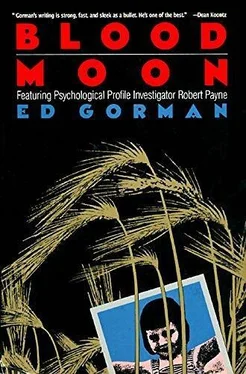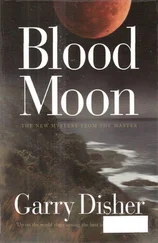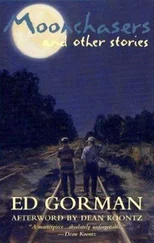“She sure is a beauty,” Jane Avery said, then turned back to me. “Is this the biplane we’re going up in?”
“It sure is.”
The plane before us was an old Travel Air, one of the first biplanes used by adventurous businessmen back in the 1920s. With a double cockpit and red paint, it still looked jaunty all these years later.
“Great,” she said.
Herb grinned. “Always like to see somebody respond to a baby like this one. Does my old heart good. You get ready. I’ll go prop her.”
“Great,” I said.
I looked at Jane. “You all right?”
She shrugged. “Just a little nervous.”
“We’ll be fine.”
“I know. It’s just—”
I smiled, leaned in and touched her hand. “Everybody gets nervous. That’s part of the whole process.”
She grinned, “You’re really a damn nice guy, you know that? Most of the time, anyway.”
We stood next to the plane. It smelled of sunlight and oil and the worn leather interior.
“Bet you wish you lived back then,” Jane said. “With the barnstormers.”
“I sure do.”
“I can see you doing that, actually. There’s something old-fashioned about you.” She squinted at me in the sunlight. “That’s why it’s so hard to imagine you working for the FBI. All that cloak and dagger.”
“Believe it or not, it’s something I believe in. That’s why I did it.”
We walked around the plane, taking another close look, two people in a field in the middle of Iowa on a lovely spring day.
For the next twenty minutes, we gave her a complete mechanical checkup, Herb and I, and then the three of us pushed her out to the small patch of runway, and Jane and I climbed in.
“Wish I was going along,” Herb shouted, just before he took the propeller and rotated it so that we could get the oil circulated through the engine.
While he was doing that, I was turning on the magneto, which is similar to popping the clutch in a car. Then Jane and I pulled down our goggles.
The plane roared into being, Jane and I waved good-bye, and then I proceeded to do all the subtle things an old craft like this demands.
Then we were airborne.
Only from the air can you appreciate how right Grant Wood was the way he painted Iowa, the rolling countryside, the checkerboard topography.
“This is great!” Jane shouted.
“Not scared?”
“Not at all!”
I gave her the grand tour, skimming low along a winding blue river, tracking between two looming clay cliffs, doing a modified roll and then following a forest of pine and hardwood that stretched for miles.
We were up high enough — but not too high — to enjoy the benefits of temperature inversions which, on a day like this one, kept the temp right at 60.
“Do another roll!” she shouted. “That was great!”
I’d made a convert, and to celebrate that fact, I did another roll. People always worry about falling out but between the strap you wear and centrifugal force, you’re actually pretty safe.
I was just taking her down lower when I realized where we were, just above the Brindle farm where the bodies of Nora and Vic had been discovered.
I also noticed something else.
A blue four-door Toyota sedan just pulling out of the barn in back.
It moved quickly down the gravel drive and out to the gravel road and headed quickly back to town.
I recognized the car, of course. It had belonged to Sam Lodge.
I had a good idea who was driving it now.
“How about one more roll?” Jane shouted, seeming not to make anything special of the blue Toyota.
“You’re crazy!” I laughed.
And then decided to put the plane into the kind of roll that both of us would remember for a long time.
This time, Jane even screamed a little bit, the way boys and girls do at county fairs their first time up on the Ferris wheel.
After saying good-bye to Herb and walking back to our respective cars, Jane said, “Did you see that blue Toyota at the Brindle farm?”
I smiled. “I was hoping you didn’t.”
“Are we competing on this case?” She sounded angry.
I wanted to tell her everything, especially about Melissa McNally’s being kidnapped, but I knew better.
“No,” I said. “We’re not competing.”
She stared at me for a long time. “This is kind of a confusing situation. And it’s my fault. Because I’m the one who’s let it become confusing.”
“What’s confusing about it?”
“I want to take you down to the station and make you tell me everything you know.”
“That’s natural enough. You’re the chief of police.”
“But I also want to invite you over for another meal tonight. Maybe some tacos or something. On me.”
“Well, why don’t I come over about eight and we’ll talk about how confusing everything is?”
“I don’t know, Robert. I just don’t know.”
We stood there and looked at each other for a time. There was nothing to say, and I knew better than to try and touch her in any way.
I gave her a little nod, got in my car, and drove away.
The historians of Cedar Rapids love to tell the story of the man who built the town’s first log cabin back in 1838.
His name was Osgood Sheperd. While most town histories love to extol the noble virtues of their first citizens, the folks in Cedar Rapids delight in revealing that Osgood was, among other things, the town’s first tavern owner and a horse thief.
In the early 1840s, the enterprising Osgood converted his cabin on the river’s edge to a drinking establishment, which was perfect for those people who wanted to get drunk before they forded the river.
As with most such places, the tavern soon developed its own group of patrons among whom were several horse thieves.
Apparently old Osgood became a part of the gang because, after closing down the tavern because of pressure from responsible civic leaders, he drifted to another state where he took up the noble calling of horse-stealing himself.
Unfortunately, Osgood wasn’t nearly as good at it as his cronies.
He was caught, and hanged by the neck until dead.
From the northernmost bluffs, Cedar Rapids looks like a picture-book city. The downtown area, abandoned by merchants who could no longer fight the fight with the malls on either edge of the city, has given way to several new buildings and complete refurbishment. It is now a business center, stocks and bonds, insurance and law offices, fund raisers and research companies. And enough BMWs to make you think that Ronald Reagan is still in office.
I drove right on through, the place I was looking for being in a somewhat-less-pricey neighborhood, one of those that the Chamber of Commerce keeps trying to will out of existence.
325 River Street was an aged concrete block building that had probably started life as a corner grocery store. It was now boarded up, covered with some rather pedestrian graffiti, and surrounded by a sidewalk that was littered with so much broken glass and trash it looked like an obstacle course.
I parked and got out.
Except for 325, this half of the block was nothing but a large grassy vacant lot. Down on the far corner, two young black men stood watching me. They were probably wondering why anybody who didn’t absolutely need to would come into a neighborhood like this.
I walked around 325 twice, looking for some kind of peephole for a glimpse inside. Nothing.
I walked down to the end of the block and the two young men. The closer I got, the older they looked. By the time I reached them, they looked a lot older, mid-twenties probably, which made their worn-backwards baseball caps seem like a wistful affectation meant to bring back their youth.
“Morning,” I said.
Читать дальше









